Food Truck POS Systems Reviews
We started with a list of 15 POS platforms frequently used by mobile food vendors and evaluated them based on five key capabilities: POS functionality, payment processing, inventory management, administration tools, and reporting and analytics. We also considered ease of use, mobile capability, and how well each system supports day-to-day operations on the road.

Otter POS – Best for Compact, Mobile Operations
Otter POS is designed with mobility in mind, making it ideal for food trucks and small-scale events. Its touchscreen interface and cloud-based software let operators manage orders and payments with minimal setup.
- Easy-to-use touchscreen system
- Portable and lightweight
- Supports multiple payment types
- Limited advanced reporting features
- Some integrations require paid plans
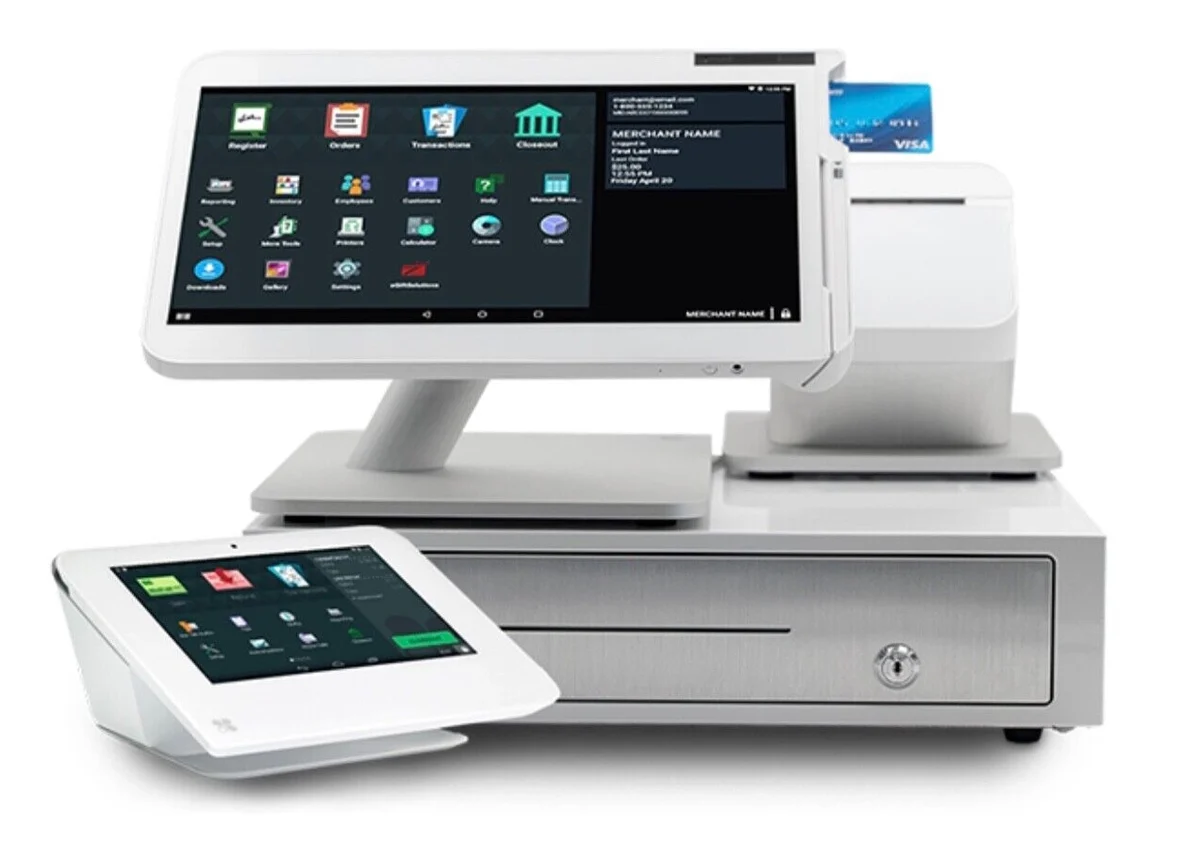
Otter POS terminal.
Get a Demo Visit Otter POS’s website
Otter POS features
- POS Functionality: Smooth, intuitive interface for fast order entry
- Payment Processing: Accepts credit cards, digital wallets, and contactless payments
- Inventory Management: Track stock levels and get alerts when items run low
- Administration Tools: Employee permissions, role management, and cloud access
- Reporting & Analytics: View sales trends and revenue in real time
How Otter POS pricing works
Otter POS offers two pricing plans for Point of Sale:
- Starter: Starting at $19/month processing fee, 3.19% + 15¢ per transaction (CP), and 3.39% + 30¢ per transaction (CNP)
- Main: Starting at $59/month processing fee, 2.39% + 15¢ per transaction (CP), and 2.99% + 30¢ per transaction (CNP)
What markets does Otter POS serve?
Otter POS is perfect for operators who prioritize mobility and simplicity without sacrificing essential functionality. It’s especially useful for trucks that move between events, fairs, or farmers’ markets, providing a fast, responsive interface for quick order taking. Small teams or solo operators will benefit from its intuitive design, allowing staff to focus on service rather than complicated software.
Read our full Otter POS review
Square – Best for Versatile, All-in-One POS
Square is a popular choice among food trucks because it combines a flexible POS with payment processing and inventory tracking in a single platform. It also works well offline and integrates with many third-party apps.
- Works offline and syncs automatically
- Extensive hardware compatibility
- Integrates with third-party services
- Transaction fees can accumulate for high-volume sales
- Some advanced features require premium plans
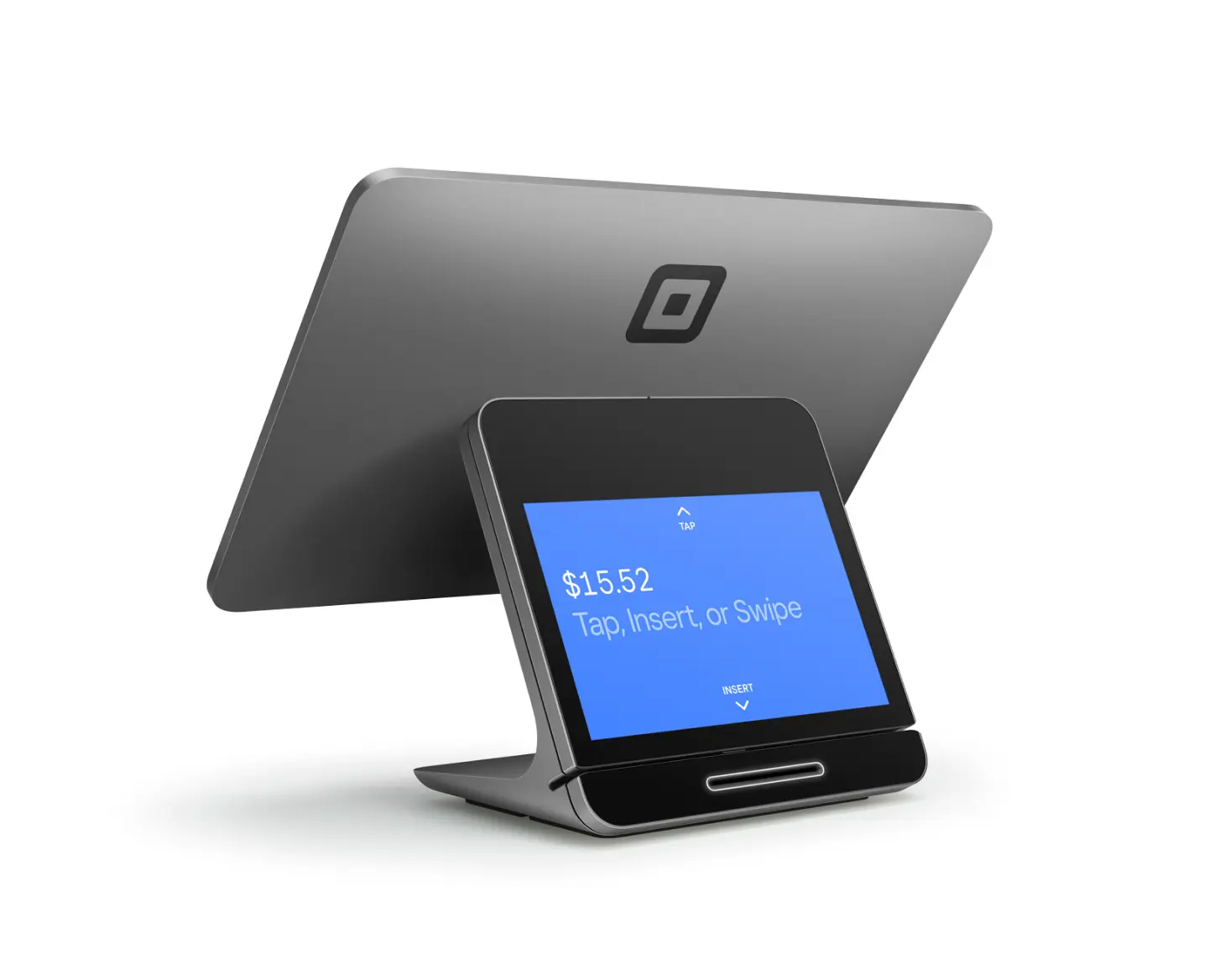
Square POS terminal.
Get Started Visit Square’s website
Square features
- POS Functionality: User-friendly interface for prompt assistance
- Payment Processing: Accepts cash, digital wallets, and credit cards
- Inventory Management: Monitor stock alerts, update menus, and keep an eye on inventory
- Administration Tools: Permissions, menu editing, and staff management
- Reporting & Analytics: Examine sales and best-selling products in real time
How Square pricing works
Square offers three plans:
- Free: Starting at $0/month + processing fees
- Plus: Starting at $29/month + processing fees
- Premium: Available by quote + processing fees
What markets does Square serve?
Because Square integrates with third-party apps like online ordering, loyalty programs, and accounting software, it’s perfect for operators who might grow their business over time. Trucks in places with poor connectivity can rely on it thanks to its offline capabilities, and it’s a good option for companies looking for a scalable solution that doesn’t require platform switching as they expand.
Read our full Square review

Toast – Best for Growing Mobile Food Businesses
Toast provides a strong solution for food trucks that need both mobility and scalability. It includes integrated payment processing, ingredient-level inventory, and detailed sales reporting.
- Cloud-based and mobile-friendly
- Detailed reporting and analytics
- Advanced inventory management
- Hardware can be pricey
- Monthly fees are required for full functionality
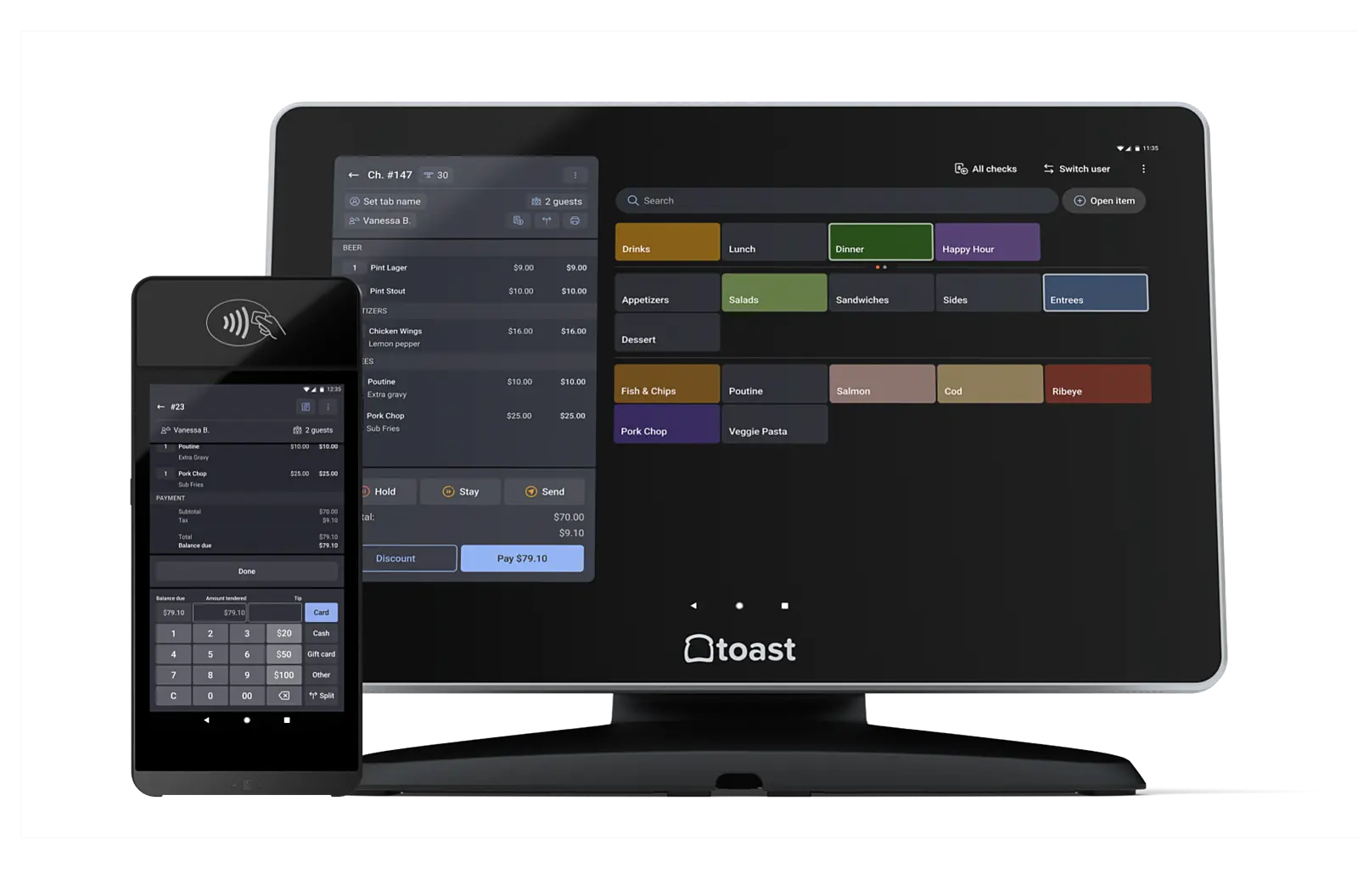
Toast POS terminal.
Get Started Visit Toast’s website
Toast features
- POS Functionality: Simple-to-use touchscreen interface
- Payment Processing: Accepts Google Pay, Apple Pay, and all major credit cards
- Inventory Management: Manage recipes, ingredients, and stock notifications
- Administration Tools: Permissions, staff scheduling, and support for multiple locations
- Reporting & Analytics: Monitor labor metrics, menu performance, and sales
How Toast pricing works
Toast offers four pricing plans:
- Starter Kit: Starting at $0/month
- Point of Sale: Starting at $69/month
- Build Your Own: Available by quote
- Save money by bundling POS and Toast Payroll: $90/month + $9/month/employee
What markets does Toast serve?
Toast provides advanced features like ingredient-level inventory tracking and comprehensive reporting, making it suitable for operators handling larger menus or higher sales volumes. It’s also ideal for owners who wish to make data-driven decisions to maximize operations and scale effectively, as it provides insights into labor costs, menu performance, and revenue trends.
Read our full Toast review

Clover – Best for Customizable POS
Clover offers modular hardware and software, letting food truck operators tailor the POS system to their workflow. It’s known for reliability and ease of setup.
- Customizable hardware options
- Wide range of payment methods
- Solid reporting tools
- Advanced features can require additional software subscriptions
- Limited offline functionality for some models
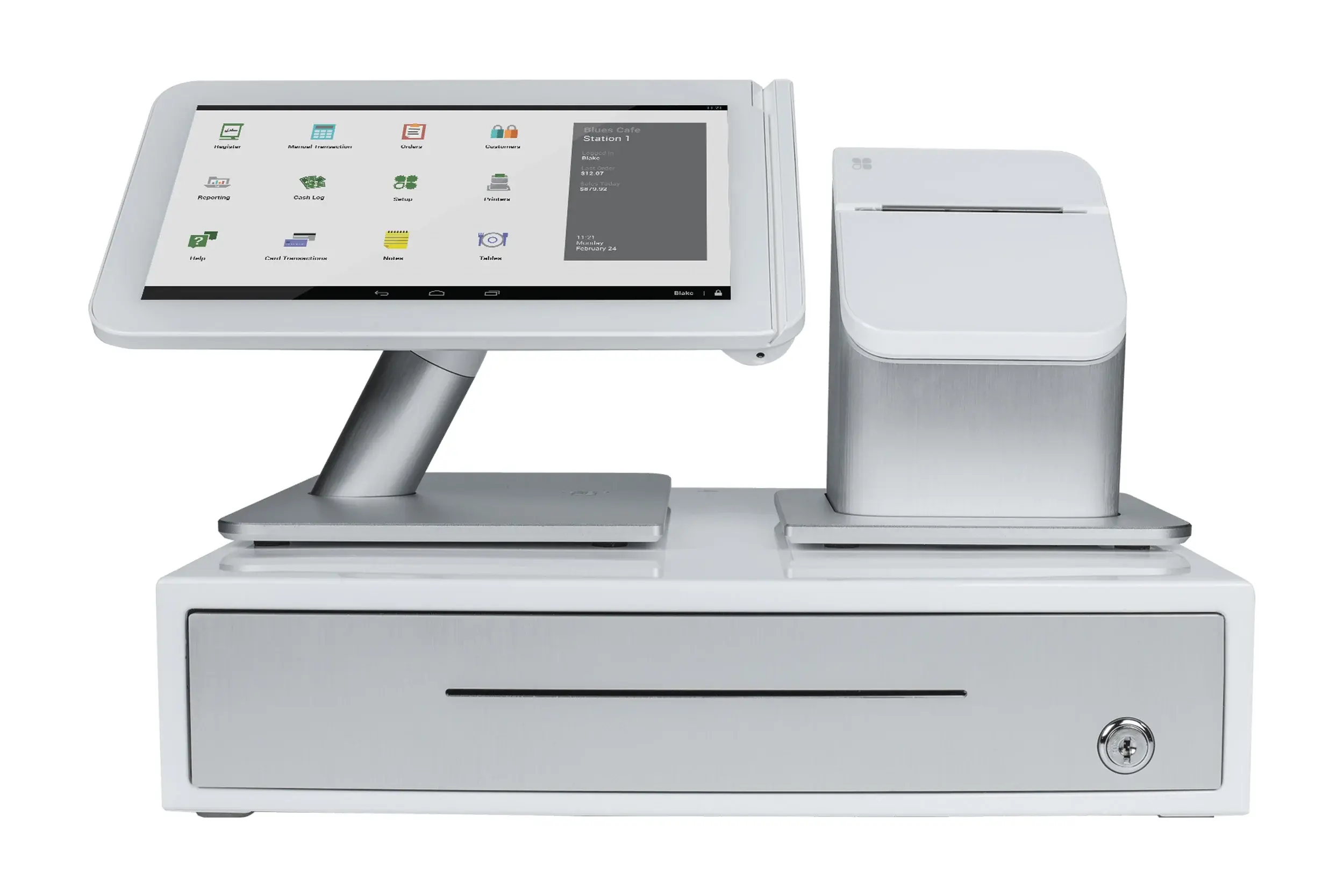
Clover POS terminal.
Clover features
- POS Functionality: Customizable touchscreen system
- Payment Processing: Accepts cards, mobile wallets, and contactless payments
- Inventory Management: Track items and generate alerts for low stock
- Administration Tools: Manage employees, access control, and device setup
- Reporting & Analytics: View detailed sales and performance reports
How Clover pricing works
Clover offers three pricing plans:
- Starter: Starting at $135/month for 36 months OR $849 + $89.95/month
- Standard: Starting at $185/month for 36 months OR $1,899 + $89.95/month
- Advanced: Starting at $245/month for 36 months OR $2,648 + $109.90/month
What markets does Clover serve?
Clover is great for operators who want modular hardware, configurable screens, and the flexibility to add features as needed. It works well for trucks with unique menu structures or specialized service styles and is a solid option for those who value reliability and the ability to expand their system with apps and custom integrations.
Read our full Clover review

SpotOn – Best for Customer Engagement
SpotOn POS is ideal for food trucks that want to combine sales management with customer engagement tools like loyalty programs and email marketing.
- Loyalty and marketing features built in
- Cloud-based system for mobility
- Easy-to-use interface
- Monthly software fees can be high for small trucks
- Limited third-party integrations
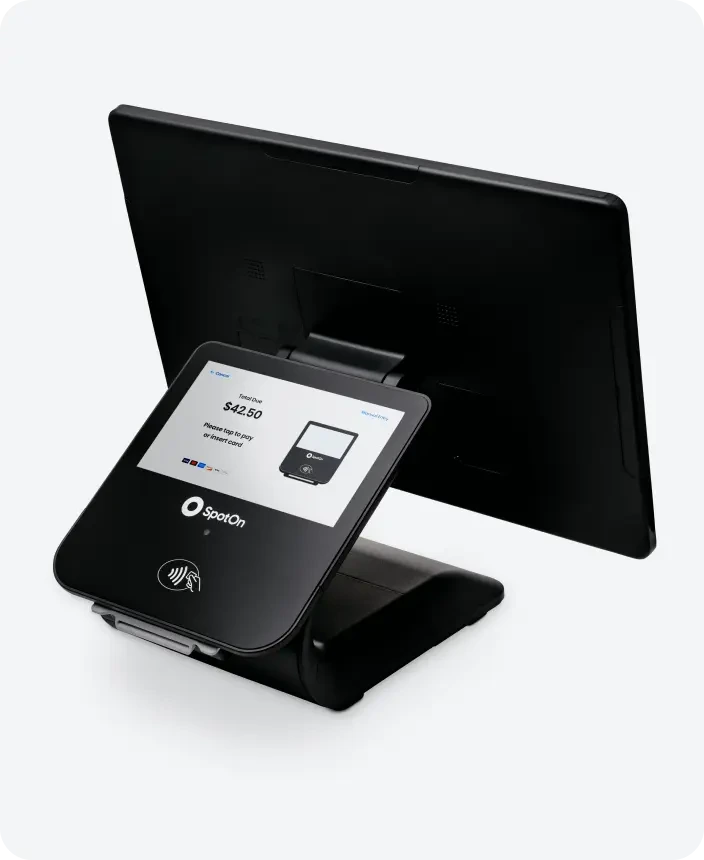
SpotOn POS terminal.
SpotOn features
- POS Functionality: Touchscreen interface optimized for speed
- Payment Processing: Accepts all major payment types
- Inventory Management: Track stock and manage menus
- Administration Tools: Employee management and permissions
- Reporting & Analytics: Sales, revenue, and customer insights
How SpotOn pricing works
SpotOn offers two tiers for either a Restaurant or Small Business:
Restaurant:
- POS Essentials: Starting at $55/month/station with 1.99% + 25¢ processing fee
- Quick Start: Starting at $0/month with 2.89% + 25¢ processing fee
- Build Your Own: Available by quote
Small Business:
- Terminal: Starting at $25/month with 1.99% + 25¢ processing fee
- Terminal + Website: Starting at $90/month with $175 setup fee and 1.99% + 25¢ processing fee
What markets does SpotOn serve?
SpotOn is ideal for operators looking to build repeat business through email campaigns, loyalty programs, and promotional offers. It’s especially helpful for trucks that rely on regular customers or operate in areas with heavy foot traffic, where engaging returning customers can increase revenue. The system balances order management with customer relationship tools to help small businesses grow.

SumUp – Best for Mobile Payment Convenience
SumUp POS is designed for mobility and simplicity, making it a strong choice for single trucks and event-based food businesses. Its compact hardware and cloud-based software make payments easy wherever you operate.
- Portable and easy to set up
- Multiple payment options, including contactless and card payments
- Cloud-based reporting
- Fewer advanced restaurant features
- Hardware sold separately
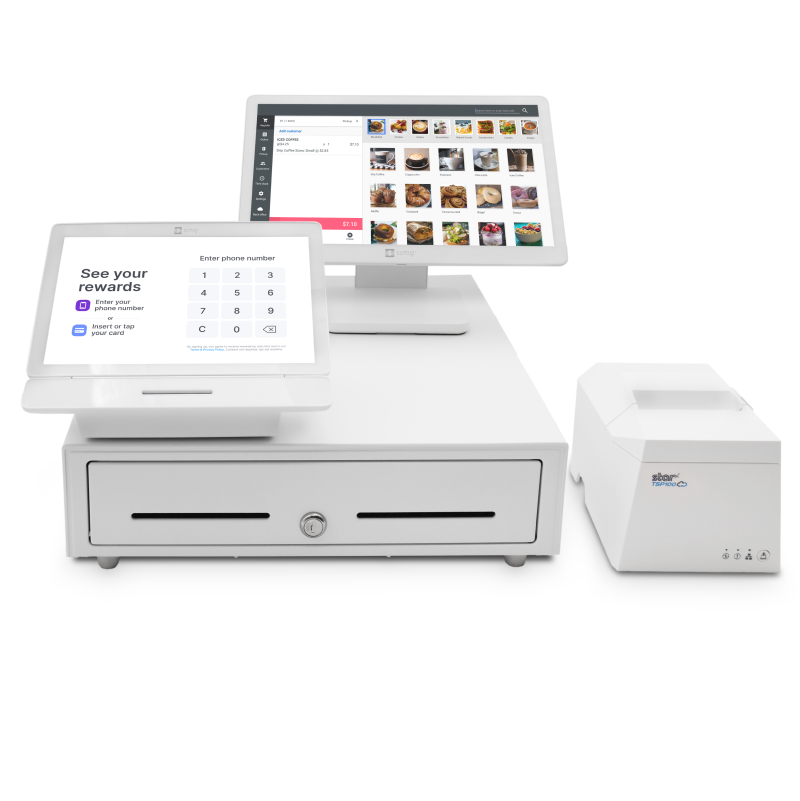
SumUp POS terminal.
SumUp features
- POS Functionality: Streamlined interface for fast service
- Payment Processing: Accept cards, contactless, and digital wallets
- Inventory Management: Real-time tracking and low-stock alerts
- Administration Tools: Manage staff and device access remotely
- Reporting & Analytics: Simple sales and trend reports
How SumUp pricing works
SumUp offers three pricing plans:
- POS with Connect Lite: Starting at $99/month
- POS with Connect Plus: Starting at $199/month
- POS with Connect Pro: Starting at $289/month
Processing fees include 2.6% + 10¢ for in person, 3.5% + 15¢ for online and manually entered, and 2.9% + 15¢ for SumUp invoicing.
What markets does SumUp serve?
SumUp is ideal for businesses that focus on fast transactions and mobility, such as festival vendors, street food stalls, or pop-up events. Its lightweight hardware and straightforward interface allow operators to start taking payments quickly, while cloud-based reporting ensures sales and inventory data are accessible without complex setups.
Compare the Best Food Truck POS Systems Side-By-Side
| Software name | Why we picked it | Starting price for cheapest plan | Highlights |
|---|---|---|---|
| Otter POS | Best for Compact, Mobile Operations | $19/month processing fee, 3.19% + 15¢ per transaction (CP), and 3.39% + 30¢ per transaction (CNP) | Portable, fast, and lightweight |
| Square | Best for Versatile, All-in-One POS | $0/month + processing fees | All-in-one platform with online ordering integrations |
| Toast | Best for Growing Mobile Food Businesses | $0/month | Advanced reporting and ingredient-level inventory |
| Clover | Best for Customizable POS | $135/month for 36 months OR $849 + $89.95/month | Customizable hardware and modular setup |
| SpotOn | Best for Customer Engagement | $0/month with 2.89% + 25¢ processing fee | Built-in loyalty and marketing tools |
| SumUp | Best for Mobile Payment Convenience | $99/month | Mobile-friendly with simple payment processing |
What are Food Truck POS Systems?
Food truck POS systems are specialized point-of-sale platforms made to assist mobile food businesses in managing sales, inventory, payments, and orders from a small, portable device. Unlike traditional restaurant POS systems, these are tailored to the unique difficulties of mobile operations, including space constraints, frequent setup and breakdown, and inconsistent connectivity at events or on the street. In order to minimize waste and prevent running out of popular items, they enable operators to take orders fast, accept a variety of payment methods, such as credit cards, contactless payments, and digital wallets, and track inventory in real time.
Beyond payment processing, food truck POS systems frequently come with features for staff management, menu customization, and reporting. Even when running a mobile business, these features enable owners to track revenue, keep an eye on sales trends, and learn more about customer preferences. A food truck POS system is a vital tool for both solo operators and expanding fleets because it centralizes critical operational tasks, improves efficiency, and facilitates better decision-making.
What Are the Must Have Features Needed in a Food Truck POS System?
A food truck POS system should include several essential features to keep operations smooth and efficient. At a minimum, it needs reliable POS functionality for quick order entry, payment processing that accepts cards, contactless payments, and digital wallets, and inventory management to track stock and alert operators when items run low. Administration tools are also crucial for managing staff, permissions, and multiple devices, while reporting and analytics provide insights into sales trends, popular menu items, and overall business performance. Together, these features help food truck owners streamline workflows, reduce errors, and make informed decisions.
How Do I Choose the Best POS System For My Food Truck Business?
Choosing the best POS system for your food truck starts with evaluating your specific needs and workflow. Consider factors like ease of use, portability, and hardware compatibility, as well as essential features such as payment processing, inventory management, staff administration, and reporting. You should also think about offline functionality, integration with online ordering or loyalty programs, and scalability if you plan to expand. Comparing pricing, customer support, and user reviews can help you find a system that balances functionality, reliability, and cost, ensuring it fits your day-to-day operations and long-term growth.
How Much Do Food Truck POS Systems Cost?
A food truck POS system’s price can vary significantly based on its features, software, and hardware needs. More sophisticated systems with inventory tracking, reporting, and marketing tools can cost anywhere from $60 to more than $100 per month, while basic software plans can start for free or around $30 to $50. Card readers, tablets, and receipt printers are examples of hardware that are frequently sold separately and can raise the initial setup cost by several hundred dollars. When budgeting, it’s crucial to take into account both monthly and per-sale expenses because many providers also impose nominal transaction fees for payments.
| Vendor | Monthly Fee | Free Trial |
|---|---|---|
| Otter POS | $19 – $59 | 14 days |
| Square | $0 – $29 | 30 days |
| Toast | $0 – $69 | No |
Food Truck POS Systems FAQs
What POS system is best for food trucks?
The best POS system for a food truck depends on your specific needs, but top options combine portability, ease of use, and essential features like payment processing, inventory management, and reporting. Systems like Otter POS and SumUp are ideal for mobile operators seeking simple, lightweight setups, while Square and Toast offer more advanced functionality for growing trucks or multi-location operations. Clover provides customizable hardware, and SpotOn is great for integrating loyalty and marketing tools. Ultimately, the best choice balances features, affordability, and reliability for your daily operations.
How do you start a food truck business?
Starting a food truck business begins with planning your concept, menu, and target market. Next, you must get the licenses, permits, and health inspections that your community requires. After that, you’ll need to buy or rent a truck, equip it with cooking and storage space, and choose a trustworthy point-of-sale system to manage orders and payments. Budgeting for inventory, personnel, and operating expenses guarantees that you can run the business sustainably, while creating a marketing plan that includes social media presence and location strategy, which helps draw clients. Your chances of a successful launch increase if you prepare thoroughly at every stage.
Is Toast POS good for food trucks?
Yes, food trucks can benefit greatly from Toast POS, particularly those looking to expand or provide a full-service experience. Toast offers a full range of features designed for mobile food operations.
Key benefits include:
- Mobile Optimization: The Toast Go® handheld devices enable employees to take orders and handle payments at the point of service, enhancing customer interaction and speed.
- Offline Mode: An essential feature for mobile businesses, Toast’s offline functionality guarantees that operations run smoothly even during internet outages.
- Integrated Tools: Integrated sales reporting, inventory management, and customer engagement tools facilitate operations and offer insightful business data.
- Flexible Pricing Plans: Toast provides scalable pricing options, such as a Starter Kit that enables food trucks to launch with little initial investment.
Although food trucks with larger transaction volumes or those looking to grow can benefit greatly from Toast’s extensive features, it’s crucial to weigh the costs and make sure they meet your company’s requirements.
Which POS system offers the best mobile features for food trucks?
For food trucks seeking robust mobile features, Square stands out as a top choice. Its Square Handheld device is particularly well-suited for mobile operations, offering a compact, splash-resistant design with a 6.2-inch touchscreen, barcode scanner, and a 16MP camera. Weighing just 11 ounces and under an inch thick, it’s one of the most portable POS devices available, making it ideal for the limited space of a food truck. Additionally, Square’s POS app includes customizable modes tailored to various industries, such as Quick Service, Bar, and Retail, enhancing its versatility for food truck operations.
Another strong contender is Toast POS, which offers a comprehensive mobile ordering solution. Designed with full-service dining and on-the-go transactions in mind, Toast provides a range of features tailored for mobile food businesses. While it excels in functionality, it may not match the mobile-first focus and intuitive design of some other systems.
Ultimately, the best POS system for your food truck depends on your specific needs and preferences. Square offers exceptional portability and ease of use, while Toast provides a more comprehensive suite of features for those seeking advanced capabilities. Consider your operational requirements, budget, and desired features to choose the system that best aligns with your business goals.
How We Chose the Best Food Truck POS Systems
To identify the best POS systems for food trucks, we started with a list of 20 popular platforms used by mobile food businesses. Each system was evaluated based on its ability to meet the unique needs of food truck operators, including speed of service, mobility, and ease of use.
We gathered data from trusted sources, including:
- Verified customer reviews from food truck operators
- Official POS system websites and product pages
- Industry review platforms and expert analyses
Every POS system was rated on a scale of 1 to 5 across four equally weighted categories, each representing 25% of the overall score:
- Variety of Features: We assessed the presence and quality of essential features, including POS functionality, payment processing, inventory management, administration tools, and reporting & analytics. Systems offering robust, mobile-friendly solutions scored highest.
- Pricing and Fees: We evaluated subscription costs, hardware requirements, transaction fees, and overall affordability. POS systems that provide strong functionality without hidden costs scored higher.
- Onboarding and Support: We considered how easy it is to set up the system, access customer support, and use training resources. Systems with reliable onboarding and responsive support earned higher marks.
- Reputation and Reliability: We examined user satisfaction, industry reputation, and system stability. POS platforms with positive reviews, dependable performance, and a strong track record in the food truck industry were rated higher.
This methodology ensures that our recommendations highlight POS systems that help food truck operators run their businesses efficiently, accept payments smoothly, and gain insights to grow their operations.